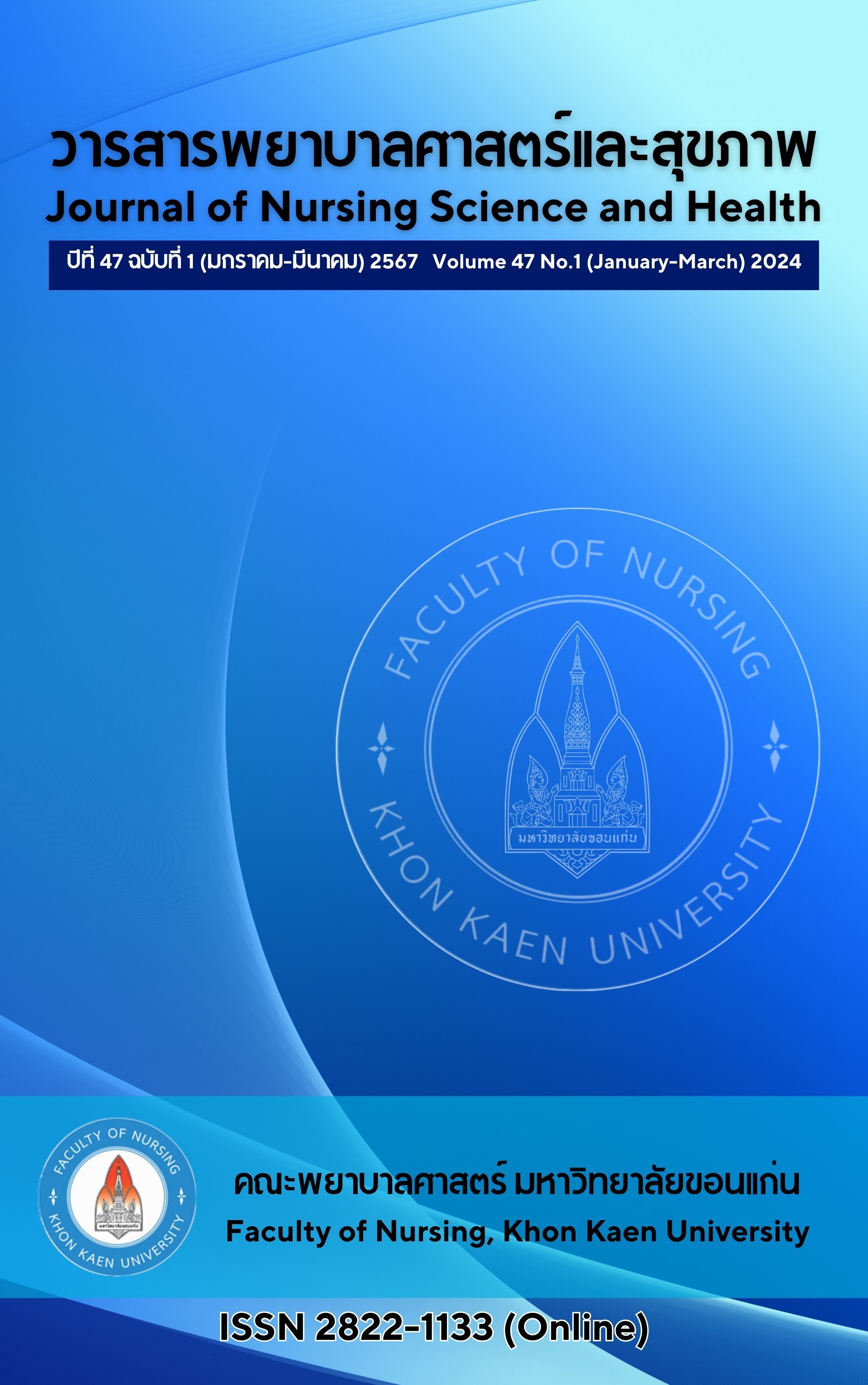ผลของการให้ข้อมูลเกี่ยวกับแนวปฏิบัติการป้องกันภาวะอุณหภูมิกายต่ำในทารกเกิดก่อนกำหนด ต่อความรู้ ทัศนคติ และการปฏิบัติของพยาบาลในหอผู้ป่วยกึ่งวิกฤตทารกแรกเกิด
คำสำคัญ:
ความรู้, ทัศนคติ , ภาวะอุณหภูมิกายต่ำ , ทารกเกิดก่อนกำหนด , หอผู้ป่วยกึ่งวิกฤตทารกแรกเกิดบทคัดย่อ
อุบัติการณ์ทารกเกิดก่อนกำหนดยังเพิ่มสูง และมีความเสี่ยงสูงต่อการเจ็บป่วยจากสาเหตุภาวะอุณหภูมิกายต่ำ พยาบาลที่ปฏิบัติหน้าที่ในการดูแลมีความจำเป็นอย่างยิ่งที่ควรต้องมีความรู้ ทัศนคติที่ดี และปฏิบัติการได้อย่างถูกต้องในการดูแลและป้องกันภาวะอุณหภูมิกายต่ำ วัตถุประสงค์เพื่อศึกษาผลของการให้ข้อมูลเกี่ยวกับแนวปฏิบัติการป้องกันภาวะอุณหภูมิกายต่ำในทารกเกิดก่อนกำหนดต่อความรู้ ทัศนคติและการปฏิบัติของพยาบาล วิธีการดำเนินวิจัย เป็นการวิจัยแบบกึ่งทดลองในกลุ่มตัวอย่างคือพยาบาลวิชาชีพที่ปฏิบัติงานใน หอผู้ป่วยกึ่งวิกฤตทารกแรกเกิด จำนวน 15 คน เก็บข้อมูลด้วยเครื่องมือที่ทดสอบค่าความตรงเชิงเนื้อหา (S-CVI) ของแบบสอบถามข้อมูลทั่วไป แบบวัดความรู้ แบบวัดทัศนคติ และแบบวัดการปฏิบัติ มีค่าเท่ากับ 0.89, 0.93, 0.92 และ 0.99 ตามลำดับ ค่าความเชื่อมั่นสัมประสิทธิ์แอลฟาของครอนบาค เท่ากับ 0.82, 0.81, 0.80 และ 0.86 ตามลำดับ วิเคราะห์ข้อมูลด้วยสถิติพรรณนา ค่าความถี่ ร้อยละ ค่าเฉลี่ย ส่วนเบี่ยงเบนมาตรฐาน และสถิติ repeated measures
ผลการวิจัยพบว่า ก่อนให้ข้อมูลความรู้อยู่ในระดับปานกลาง (M=9.7, SD=3.0) หลังอยู่ในระดับสูง (M=15.5, SD=2.2) ก่อนให้ข้อมูลทัศนคติอยู่ในระดับปานกลาง (M=71.8, SD=3.6) หลังอยู่ในระดับสูง (M=89.1, SD=9.4) และก่อนให้ข้อมูลการปฏิบัติอยู่ในระดับปานกลาง (M=25.9, SD=5.9) หลังอยู่ในระดับสูง (M=32.1, SD=6.5) สรุปผล ควรมีการส่งเสริมการให้ข้อมูลป้องกันภาวะอุณหภูมิกายต่ำในทารกเกิดก่อนกำหนดแก่พยาบาลก่อนปฏิบัติหน้าที่ เนื่องจากความรู้ ทัศนคติและการปฏิบัติที่ดีขึ้น จะช่วยส่งผลให้อัตราการเจ็บป่วยของทารกเกิดก่อนกำหนดจากภาวะอุณหภูมิกายต่ำลดลง
เอกสารอ้างอิง
World Health Organization [WHO]. Preterm birth [Internet]. Geneva: R&D Blueprint; 2018 [cited 2023 Jul 10]. Available from: https://www.who.int/news-room/fact-sheets/detail/preterm-birth
Ruangnapa K, Wongchanchailert M. Basic pediatric procedure. Songkla: Department of Pediatrics Faculty of Medicine Prince of Songkla University; 2017. (in Thai)
Wonnachot J. The control of newborn body temperature. JPNC 2012;23(1):81–93. (in Thai)
Kaenkasikran N. Prevention of hypothermia in newborns. 4th service plan sharing 2017. Exchange of knowledge and development of the health service system: Road to service plan 4.0. Public Health Administration Division. Office of the permanent secretary, Ministry of Public Health; 2017. p.1–29. (in Thai)
Carolyn J. Physical examination and health assessment–canadian. 3rd ed. Saunders: Canada; 2019. p.960.
Thaithumyanon P. Caring for low-birth-weight babies, premature babies in the Royal College of Thai Pediatrics, newborn. Bangkok: The Royal College of Thai Pediatrics; 2018. p.37–48. (in Thai)
Cinar ND, Filiz TM. Neonatal thermoregulation. J Neonatal Nurs 2016;12(2):69–74.
Pengsa K, Siriwitchayakul S, Junthavanit P. Pediatric infectious diseases. Bangkok: Department of Tropical Pediatrics Faculty of Tropical Medicine, Mahidol University; 2015. (in Thai)
Knobel RB, Levy J, Katz L, Guenther B, Holditch-Davis D. A pilot study to examine maturation of body temperature control in preterm infants. J Obstet Gynecol Neonatal Nurs 2013;42(5): 562-74. doi:10.1111/1552-6909.12240.
Kongsriparn M, Osotsatien S, Rongmuang D. Effects of an evidence-based nursing practice program on knowledge, attitudes and practices of nurses: Case study at the cardiac intensive care unit Surat-Thani hospital. Documents for the meeting presenting research results for graduate studies 3rd. Thammasat University. Seminar building 1–2. Sukhothai Thammathirat University; 2013. p.1–13. (in Thai)
Sangmanee W, Watanasit Y, Kaewvichit N. Knowledge, attitude and practice perceived by nurses toward incident reporting in Songklanagarind hospital. pnujr 2018;10(3):94–102. (in Thai)
Ministry of Public Health. Premature baby statistics in 2022 [Internet]. Bangkok: Ministry of Public Health; 2022 [cited 2023 Jul 15]. Available from: https://moph.go.th/ (in Thai)
Srinagarind hospital. History [Internet]. Khon Kaen: Srinagarind hospital; 2023 [cite 2023 Jul 15]. Available from: https://srinagarind.md.kku.ac.th/post/1 (in Thai)
Intermediate Care and Special Care Nursery. Patient statistics in 2018-2020. Khon Kaen: Srinagarind hospital Faculty of Medicine, Khon Kaen University; 2020. (in Thai)
Chaonarin P, Deawprasert T, Ariyaprana P, Keeratavanithsathian S. Prevention of hypothermia in the newborn. TJN 2021;70(4):52-9. (in Thai)
Thanomlikhit C, Kheawwan P. Nurse residency coordinator: An important role for professional nursing development. TJNMP 2018;5(2):96-110. (in Thai)
Sibounheuang S, Supamanee T, Thungjaroenkul P. Knowledge, attitude, and practice in nursing process among nurses, Lao people’s democratic republic. Nursing J 2016; 43 Suppl December:141-50. (in Thai)
Sriampaiwaraporn A, Kunawat P, Kunpaibutr T. Knowledge, attitude, and practice on classification of patients among nurses in UdonThani cancer hospital. Nursing Health and Education Journal 2019;2(4):29-39. (in Thai)
Tomon S, Saneha C, Sriprasong S, Dumavibhat C. The influences of anxiety, attitudes, beliefs, and knowledge about symptoms on decision-making time in seeking treatment in patients with acute coronary syndrome. Nurs Sci J Thai 2019;37(2):60-77. (in Thai)
Kaliyaperumal K. Guideline for conducting a knowledge, attitude and practice (KAP) study [Internet]. Saudi Arabia: Jazan University; 2004 [cited 2022 Aug 20]. Available from: http://www.researchgate.net/publication
Wonginchan A, Tangpukdee J, Phongam P, Suwannarach S. Sawatdikun N. System concept: How to prevent choosy eating (picky eating) in early childhood children. Journal of Nursing Science & Health 2021;44(3):84-97. (in Thai)
Faul F, Erdfelder E, Buchner A, Lang AG. Statistical power analyses using G*Power 3.1: Tests for correlation and regression analyses. Behav Res Methods 2009;41(1):149-60.
Wonginchan A, Tangpukdee J, Wonginchan S, Kearttiwongkru S, Khonggungong S. Development of an instrument for measuring health problem levels of school-aged children who have access to online media in the Thailand 4.0: IMHP-SaC. Journal of Nursing Science & Health 2022;45(1):99-101. (in Thai)
Prasanwon K, Patoomwan A, Pookboonmee R. Nurses’ knowledge, attitude, and nursing practices for pain management for postoperative children. Rama Nurs J 2018;24(1):37-50. (in Thai)
Pothamuang W. Effects of the evidence-based practice promotion for acute pain management in neonates on knowledge, practices among nurses and effectiveness of pain management at Thammasat University Hospital. Unit pediatric ward, Thammasat University Hospital; 2012. (in Thai)
Khangrang M, Soekphukhiao P. The results of promoting a program of evidence-based practice in nursing practice for knowledge and the practice of nurses in acute pain management for the newborn. Journal of Ratchathani Innovative Health Sciences 2017;1(3):31–51. (in Thai)
Kongtan A. Effect of information provision using video media on professional nurses' knowledge and practice in prevention of intravenous infusion related infections [Thesis]. Chiang Mai: Chiang Mai University; 2010.
Hormniam N. Health care innovative leadership in the nursing profession. Udonthani Hospital Medical Journal 2020;28(2):244-53. (in Thai)
ดาวน์โหลด
เผยแพร่แล้ว
รูปแบบการอ้างอิง
ฉบับ
ประเภทบทความ
สัญญาอนุญาต
ลิขสิทธิ์ (c) 2023 วารสารพยาบาลศาสตร์และสุขภาพ

อนุญาตภายใต้เงื่อนไข Creative Commons Attribution-NonCommercial-NoDerivatives 4.0 International License.
วารสารพยาบาลศาสตร์และสุขภาพเป็นเจ้าของลิขสิทธิ์ในการเผยแพร่ผลงานที่ตีพิมพ์ห้ามผู้ใดนำบทความที่ได้รับการตีพิมพ์ในวารสารพยาบาลศาสตร์และสุขภาพไปเผยแพร่ในลักษณะต่าง ๆ ดังนี้ การนำบทความไปเผยแพร่ออนไลน์ การถ่ายเอกสารบทความเพื่อกิจกรรมที่ไม่ใช่การเรียนการสอน การส่งบทความไปตีพิมพ์เผยแพร่ที่อื่น ยกเว้นเสียแต่ได้รับอนุญาตจากวารสารพยาบาลศาสตร์และสุขภาพ



